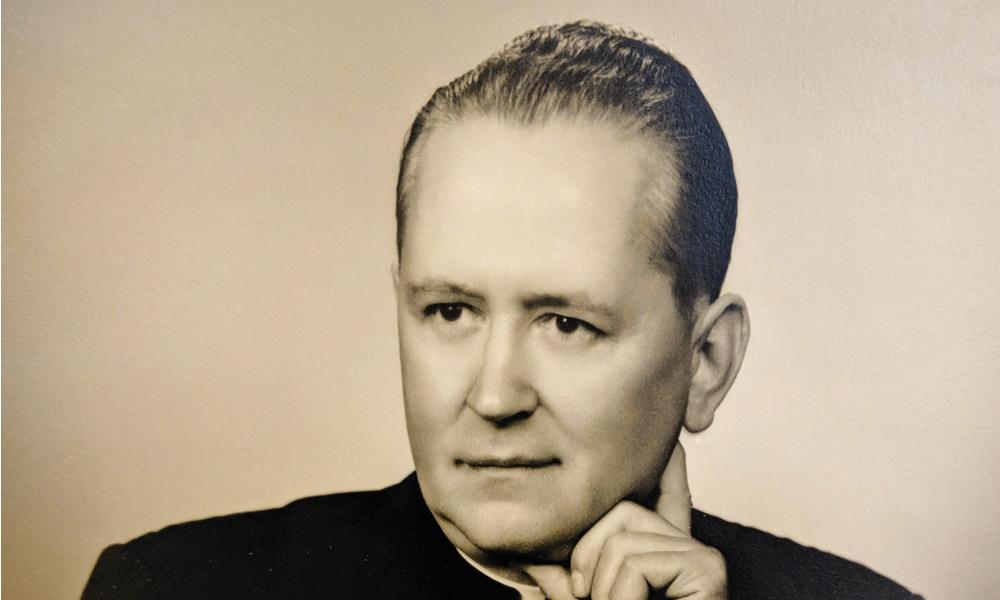
In Russia, you would be …
Anyone associated with Rev. Victor Breznikar (1915-1998) recognizes his iconic epithet and knows how it concludes. Victor died more than 20 years ago. He was pastor at St. Francis in Walla Walla (1961-74). Most of these years encompassed my seminary formation. I got to know him well, or as well as one could. A native of Slovenia (more of an ethnic designation than a political entity at the time), he possessed an Old World charm. He probably would refer to this quality as “finesse.” In commenting on someone’s less than polished approach, he would say, “No finesse.” I remember my mother referring to him as “the prince.” A precious document in our archive is his brief memoir, primarily an account of his precarious existence during World War II and its aftermath. The war had broken out just before he was ordained (July 7, 1940). No young priest could have had a more dramatic and demanding ministry, including being arrested by the Italians, charged as il capo di banditi and sentenced to a firing squad. Luckily, he wasn’t in Russia. There was a reprieve. Though he may have been a prince, I don’t suppose he regretted losing out on the martyr’s crown. Fleeing for his life from Nazis, Fascists and Communists, he finally emigrated to the U.S. in 1949. Bishop White accepted him into our diocese.
On my regular trips to Walla Walla, I stopped to see him at Colfax, where he was pastor from 1974-85. When he retired in Walla Walla, the visits continued.
As I reflect on priests who have been influential in my life, he looms large. It was not his piety, prayerfulness or preaching that affected me, but rather his humor and humanity. Let me run through a few of his life lessons.
On sin: two were singled out, intellectual pride and invidia clericalis. I’ll let you plug that into Google if you need to know more. Not far away was the darker side of our humanity – not a sin – but its close companion in propagating misery. “Mental depression. You’ve got to fight it,” was his often offered advice.
On hospitality: always open the door, and invite your visitor in. Have something to eat, usually sweet; offer something to drink. An honored guest received a shot of slivovitz. This plum brandy of Eastern European origin does more to explain the temperament of the Balkans than anything you’ll read in history or social studies.
Victor loved his jokes. I remember some of his punch lines. I recall them because he did not tire of retelling them time and again.
A couple approached him: “Father Breznikar, we want to get married, but we don’t want a religious ceremony. We are atheists.”
“Atheists! You don’t have the brains to be atheists!”
We had another Slovenian priest in our diocese, Al Breznik, who asked Victor : “What is the difference between Breznik and Breznikar?”
“Breznik is a poor guy who has no car!”
At a priests’ gathering, the bishop commented: “Victor, look at the priests, how well they get along; how happy they are.”
“Yes, but half of them are mentally retarded!” They probably had been drinking slivovitz.
However, I do not recall him singling out any priest for rebuke or criticism. Well, maybe there was one. With respect to my cousin, the venerable Msgr. Hugo Pautler, he commented, “Do you know the etymology of monsignor? Mons ignorantiae, mountain of ignorance.”
He loved beauty. He made sure the church was attractive, especially at Christmas when the sanctuary was transformed into a starlit forest. As our pastor during the post-Vatican II era, he converted the drab St. Francis interior into a more elegant space. (As an aside, I commend St. Francis for their most recent remodel) Although the Breznikar’s remodel appealed to the eye, he did not overcome a fundamental structural flaw, the small sacristy. For most occasions, the space constraint did not present a problem, but at times it did. I recall an occasion when Confirmation was celebrated at St. Francis. All the Walla Walla priests were there, packed into the sacristy. And Victor couldn’t resist. “Who built this sacristy? In Russia, he would be shot!” Of course, he knew full well that Msgr. Pautler, one of those in the sacristy, had built the church.



